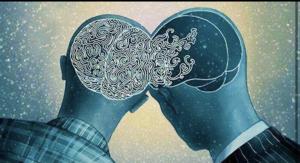This people honors me with their lips, but their hearts are far from me; in vain do they worship me, teaching as doctrines human precepts (Mark 7:6–7).
I had such great plans for this week’s Dark Devotional. Last Thursday, I looked at the upcoming readings well ahead of time, found a verse I decided would pair perfectly with riffing off of yet another faux Screwtape letter, written in the style of C.S. Lewis’s demon, I’d found online, and got my editor’s permission to write my own Screwtapian style letter (something I’ve done before). I was feeling rather smug that evening as I saved the materials I’d need for reference to a file and went to bed.
I woke up in the middle of the night with my throat on fire. Two home COVID tests and a week later, I’m reasonably sure I don’t have COVID but I do have the Mommie Dearest of all colds. I’ve spent the past week surviving on NyQuil, throat lozenges, and Grubhub, barely able to muster the energy to binge watch The Golden Girls in between whining to friends on Facebook—much less channel Screwtape.
It all started when I went out to my car last week and found a flat tire. I live in a remote area that’s rather inaccessible to tow trucks, so I found a mobile tire repair service through Google. The service technician who came out was an elderly gentleman. As he finished the job, he seemed somewhat shaky on his feet. To my horror, he collapsed onto his back. Without thinking about the fact that we now live in a world in which it’s no longer safe to rush to the aid of strangers in distress, I helped him to his feet. At his request, I walked him to his truck.
Two days later, I was flat on my own back in bed. Since the pandemic started, compounded by unemployment, I hardly go out anymore and hadn’t driven anywhere in days. I can only assume that the service technician was the source of the cold I’ve been battling for the last week.
When I finally felt somewhat human again and pulled up the notes I’d saved for this week’s Dark Devotional, I looked through Joe Rigney’s Screwtapian letter, “The Enticing Sin of Empathy: How Satan Corrupts through Compassion,” with fresh (albeit streaming) eyes. I no longer felt up to channeling Screwtape myself, but I was interested to see how Rigney managed to come to the conclusion that empathy is a sin.
When humans are suffering, they tend to make two demands that are impossible to fulfill simultaneously. … In one breath, they say, “Help me! Can’t you see I’m suffering?” and in the next they say, “How dare you act as though I needed you and your help?” The sufferer doesn’t want to be alone, and demands not to be pitied.
I don’t know where Rigney got the idea that people who are suffering spit on those who offer them help. When the service tech collapsed in my driveway, he didn’t ask for help, but neither did he reject my assistance in helping him up. He asked me to get him to his truck and accepted my offer to bring him a bottle of water. When he asked to rest for a while in his truck, I went back to my porch and gave him space.
In my experience, what tends to annoy someone who is suffering is when personal dignity and agency are ignored, in favor of whatever the “helper” thinks is best for that person. Had I ignored what the tech asked for (assistance to his truck, time to rest) and tried to force on him solutions I thought he needed, he’d probably have been rightfully annoyed.
Our alternative [to compassion], empathy, shifts the focus from the sufferer’s good to the sufferer’s feelings, making them the measure of whether a person is truly “loved.” We teach the humans that unless they subordinate their feelings entirely to the misery, pain, sorrow, and even sin and unbelief of the afflicted, they are not loving them.
Ah, here we have it. Rigney is worried that attempting to see the world from someone else’s perspective, to understand his worldview and why he believes as he does will mean validating feelings Rigney believes are “sinful.” In fact, he seems to suggest that empathy is a “sin” because Christians might possibly accept someone’s feelings as an expression of truth.
If we accept someone’s feelings as an expression of truth—say, we accept that love is love, and that the love between two consenting adults may be an expression of truth, even if it contradicts our own values—then who knows where such acceptance might lead us. We might start to question the traditional definitions of morality passed down to us by theologians and authorities in the Church.
When Jesus was asked why his disciples ignored the traditional injunctions for washing hands, he didn’t deny the importance of tradition. In fact, he appealed to tradition, citing the prophet Isaiah. “This people honors me with their lips, but their hearts are far from me” (Mark 7:6). They knew what the law prescribed, they could recite it well. But their hearts were elsewhere.
The same is true today. Lots of fundamentalist Christians can recite the Ten Commandments by heart. Many conservative Catholics (who are often fundamentalists themselves) can pull up chapter and verse from the Catechism of the Catholic Church and canon law. “See, it’s right there in the Church’s documents!” they’ll say, their tone triumphant. Any attempts to point to individual experience are met with scorn. “Truth doesn’t care about your feelings!”
But Jesus is the way, the truth, and the life (John 14:6), and he did care about what was in people’s hearts. If anything, feelings mattered more than words: “Nothing that enters one from outside can defile that person; but the things that come out from within are what defile” (Mark 7:15). “Within people, from their hearts, come evil thoughts,” Christ said. And those thoughts, which come from their hearts, the seat of feelings, are what defile a man.
It’s no wonder many fundamentalist Christians (Catholic and Protestant alike) fear empathy. Understanding another person’s feelings to such an extent that we can begin to see the rays of truth in those feelings that are beyond our understanding may just upset the applecart of our moral certainties. I have no doubt that Screwtape would be very pleased to see the patients clinging to their own certainties so tightly that they refuse to draw close enough through empathy to see the reflection of the Enemy in each other.
And, now, if you’ll excuse me, I’m going back to bed.
Michelle Arnold was a staff apologist for Catholic Answers, a Catholic apologetics apostolate in the Diocese of San Diego, California, from 2003–2020, answering questions from clients about the Catholic faith via phone, letter, email, and online platforms. She contributed essays to Catholic Answers’ online and print magazines, and wrote four booklets for the apostolate’s 20 Answers series. Her 20 Answers booklets were on Judaism, the New Age, witchcraft and the occult, and the Church’s liturgical year. Now a freelance writer, editor, and proofreader, Michelle Arnold has a blog at the Patheos Catholic channel. A portfolio of her published essays is available at Authory.













